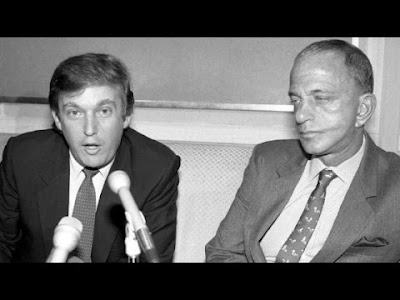"This Committee owes an apology!"
By Phil Mattera for the Dirt Diggers
Digest
 |
| Donald Trump and his mentor, Roy Cohn |
Corporate violators, on the other hand, can use lobbying and
campaign spending to push for policies that may make it less likely their
wrongdoing will be detected or will be treated more leniently if it is
discovered.
Much of this business effort is exercised through trade
associations, and probably the biggest influencer of them all is the U.S.
Chamber of Commerce. As is highlighted in a new report from Public Citizen, the
Chamber has been an outspoken opponent of the Biden Administration’s plan to
adopt a more aggressive posture toward corporate misconduct.
It has been especially critical of a new approach being taken by
the Federal Trade Commission, which voted in November to expand its criminal
referral program. While the FTC itself can bring only civil actions, the agency
can pass on evidence of corporate criminality to the Justice Department—and now
it will be doing more of that. The Chamber accused the FTC of “waging a war against
American businesses” and vowed to “use every tool at our disposal, including
litigation, to stop its abuse of power.”
The Public Citizen report demonstrates why the Chamber is so
agitated: many of its leading members have been involved in significant cases
of malfeasance in the past and are likely to be similarly embroiled in the
future.
Using extensive data from Violation
Tracker, the report shows that the known members of the Chamber have
been involved in thousands of civil and criminal matters and have paid more
than $150 billion in fines and settlements.
Three major banks—JPMorgan Chase, Citigroup and Wells
Fargo—alone account for $81 billion in penalties, and the pharmaceutical
industry another $26 billion.
While these numbers represent all forms of misconduct, Public Citizen gives special attention to the 19 Chamber members that have been involved in criminal cases. Among them are Amgen (illegal drug promotion), Bayer (price-fixing) and Zimmer Biomet (Foreign Corrupt Practices Act).
The report notes that at several other Chamber members such as
American Express are reported to be targets of current criminal investigations.
Public Citizen looks at overall corporate rap sheets, but given
the Chamber’s hyperbolic statements about the FTC, it is worth zeroing in on
cases brought by that agency.
As Violation Tracker shows, the FTC has fined companies over $14
billion since 2000. More than one-third of that total comes from a single case
brought against a Chamber member. Facebook, whose parent company is now called
Meta Platforms, was penalized $5 billion in 2019 for deceiving users
about their ability to control the privacy of their personal information.
Other Chamber members involved in significant FTC cases include:
Citigroup, which paid $215 million to resolve allegations that
two of its subsidiaries engaged in deceptive subprime lending practices;
Alphabet, whose Google subsidiary paid $136 million for violating rules
regarding the online collection of personal data on children; and AT&T,
whose AT&T Mobility subsidiary paid $80 million to the FTC to provide refunds
to consumers the company unlawfully billed for unauthorized third-party
charges.
These were all civil matters. The Chamber is apparently worried
that such cases could now result in referrals to the Justice Department for
criminal prosecution, especially since the DOJ is vowing to bring more such
actions.
The next few years will be a test of whether more aggressive
regulators and prosecutors can overcome the power of the corporate crime lobby.